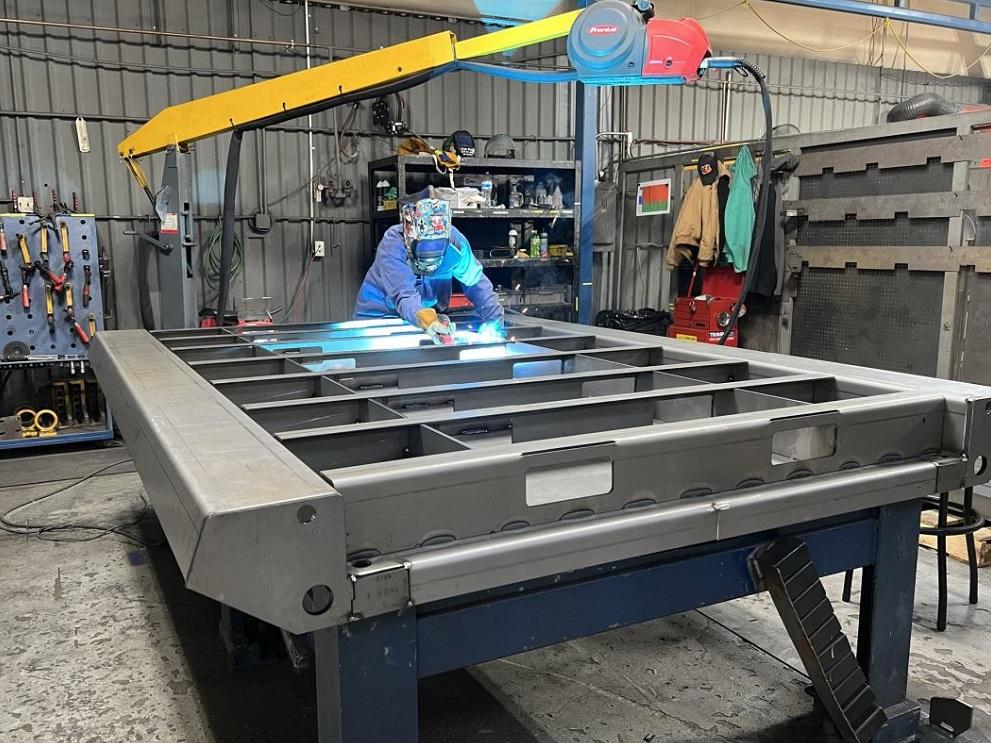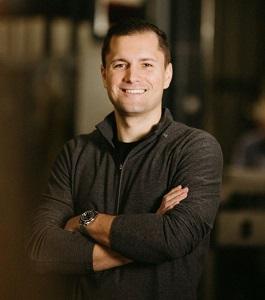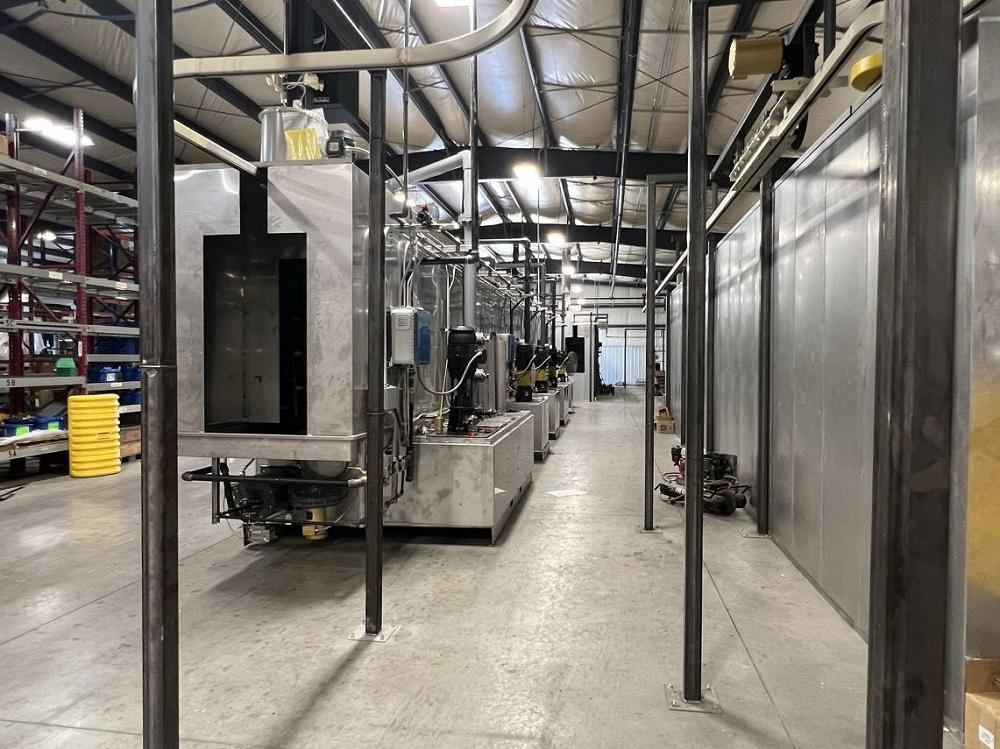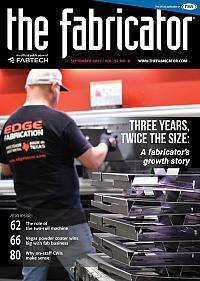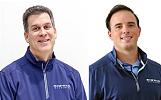Senior Editor
- FMA
- The Fabricator
- FABTECH
- Canadian Metalworking
Categories
- Additive Manufacturing
- Aluminum Welding
- Arc Welding
- Assembly and Joining
- Automation and Robotics
- Bending and Forming
- Consumables
- Cutting and Weld Prep
- Electric Vehicles
- En Español
- Finishing
- Hydroforming
- Laser Cutting
- Laser Welding
- Machining
- Manufacturing Software
- Materials Handling
- Metals/Materials
- Oxyfuel Cutting
- Plasma Cutting
- Power Tools
- Punching and Other Holemaking
- Roll Forming
- Safety
- Sawing
- Shearing
- Shop Management
- Testing and Measuring
- Tube and Pipe Fabrication
- Tube and Pipe Production
- Waterjet Cutting
Industry Directory
Webcasts
Podcasts
FAB 40
Advertise
Subscribe
Account Login
Search
How one Millennial entrepreneur gambled with no fabrication experience
New owner steers Ohio-based custom metal fabrication shop Everyday Technologies toward growth
- By Tim Heston
- September 16, 2022
- Article
- Shop Management
For years, industry leaders have rung the alarm about the graying workforce. At FABTECH and other industry events, speakers opine about the industry’s frustrations, how young people just don’t want to put in the hours anymore. What’s in it for them seems to be all that matters.
While speakers pontificate away, businesses have been quietly changing hands, and not necessarily to strip-and-flip investors. New owners are playing the long game, and a lot of that has to do with the kind of business owners who gravitate to metal fabrication. “The previous owners here wanted to sell to someone with good intentions, someone who cared about the community.”
That was Cody Lee, president of Everyday Technologies. Lee purchased the Sidney, Ohio, custom metal fabricator from two brothers, Mike and Bruce Toal, who had guided the business for more than 20 years. Lee had no deep ties to sheet metal, no family business connection. He hadn’t grown up welding, doing manual layout or bend calculations, or nesting for the punch press or laser.
Lee had seen his father-in-law take a food processing business from nothing and turn it into a multimillion-dollar enterprise. He knew about manufacturing’s challenges, but he also knew it wasn’t dying. On the contrary, he saw a bright future, which is why in 2021 he decided—despite everything, including a pandemic—to purchase Everyday Technologies and take the plunge into the custom sheet metal arena. This year, Lee celebrated his 30th birthday.
Plant Additions and Chicken Coops
Lee met Everyday’s previous owners through his prior job at a general contractor, where he worked with various manufacturers on plant expansions. In fact, working on those expansions gave Lee a window into the challenges and opportunities successful manufacturers face. He saw how they used space to increase capacity, reconfigure process flow, serve customers better, attract talented people, and build a better business.
Lee met such people at various manufacturers around western Ohio, including the Toal brothers at Everyday, who had contracted with Lee’s then employer to expand the Sidney, Ohio, plant by 40,000 sq. ft.
“That was about five years before I purchased the business,” Lee recalled, “so Everyday Technologies was on my radar … for years, I knew I wanted to own and run my own company. So it came to a point at my last employer where I told myself, ‘If I’m going to do this, I need to do it now.’”
Everyday’s previous owners purchased the company in 1999 from the founding family who, several generations before, launched Everyday to make, of all things, chicken coops. The company got its start in 1928 in rural western Ohio, a time and place where chicken coops were, well, everyday items.
Everyday’s focus gradually shifted away from chicken coops and toward sheet metal job shop work. By the time the brothers had purchased Everyday in 1999, they upgraded the technology, purchased a small wire harness manufacturer in 2016, and expanded the original plant’s footprint, meeting Lee in the process.
The pandemic delayed Lee’s purchase, but it didn’t halt it. In fact, the pandemic acted as a financial stress test of sorts. At that point Everyday had grown beyond job shop work to focus more on contract fabrication, and some of its largest customers were in essential industries, including components for commercial refrigeration (including compressor components) and construction equipment. Orders slowed, but they also recovered quickly.
As Lee recalled, overall uncertainty during the pandemic’s opening salvos was more behind the delay than any real problems with Everyday’s business. “We were faced with this, ‘What’s next?’ mentality,” Lee recalled. “We agreed to put it on pause, but just several months later we dove back into it. At that point, we went through the formal due diligence and all the typical elements that go with purchasing a business.”
Upgrading the Constraints
Lee had arrived at Everyday a sheet metal greenhorn, but he wasn’t a stranger to manufacturing’s broader challenges—especially when it comes to constraints in part flow. Working for a general contractor, Lee had worked with manufacturers on various kinds of facility expansions. Whether the project involved office space, production space, or warehouse space, the expansion always dealt with how work flowed through the business.
In 2021, considering the company’s aging blanking technology, a laser cutting upgrade seemed to be a no-brainer. Along with a few turret punches, the place ran three CO2 laser cutting systems, including one that had been running for two decades. “The resonator had 150,000 hours on it,” Lee said. “But the previous owners had instituted good preventive maintenance practices, and they made it work.”
But like he did at the general contractor, Lee looked at the entire process. “When I got here, I had asked managers about constraints, and they mentioned the lasers, but they also mentioned paint.”
Last year, Everyday’s powder coating capabilities included a manual, batch-style line for large and awkward workpieces along with an automated line complete with mechanized guns. Installed at a leased facility and designed to handle the shop’s higher-volume stamped components, the system had been running since the 1970s. “The capacity is tapped there,” Lee said, “and the equipment is fickle. So this new line is replacing that. It’s like going from a 1989 Honda Accord to a new Bentley.
“The new line has robotic arms that are powder coating the parts,” Lee continued. “Parts go through a five-stage wash, through a drying oven, then through the automated powder coating booth.” He added that the line works in conjunction with a manual booth that handles the part flow as the automated line undergoes color changes.
Blanking is getting an upgrade too, of course. Yes, powder coating might be a constraint, but unreliable cutting can starve everything downstream—hence the reason for Everyday’s dramatic upgrade this year, replacing a 20-year-old CO2 system with a 10-kW solid-state, automated load/unload TRUMPF laser. The system connects with the company’s existing 30-shelf tower system.
“For us, that machine is the equivalent of two and a half older systems,” Lee said, “especially when you couple it with the automation.”
The company is also integrating a new ERP system from Plex Systems, an integration that began in the summer and will continue into 2023. As Lee put it, “We’re making the upgrade to give us more effective tools for managing the business, from more accurate inventory management, job costing data, production scheduling, capacity management, and EDI [electronic data interchange] to communicate with our customer portals.”
Beyond this, Lee and his leadership team are tackling the manual welding operation. The previous owners had built up Everyday’s welding expertise, contracting with a certified welding inspector (CWI) to qualify personnel for code-level work.
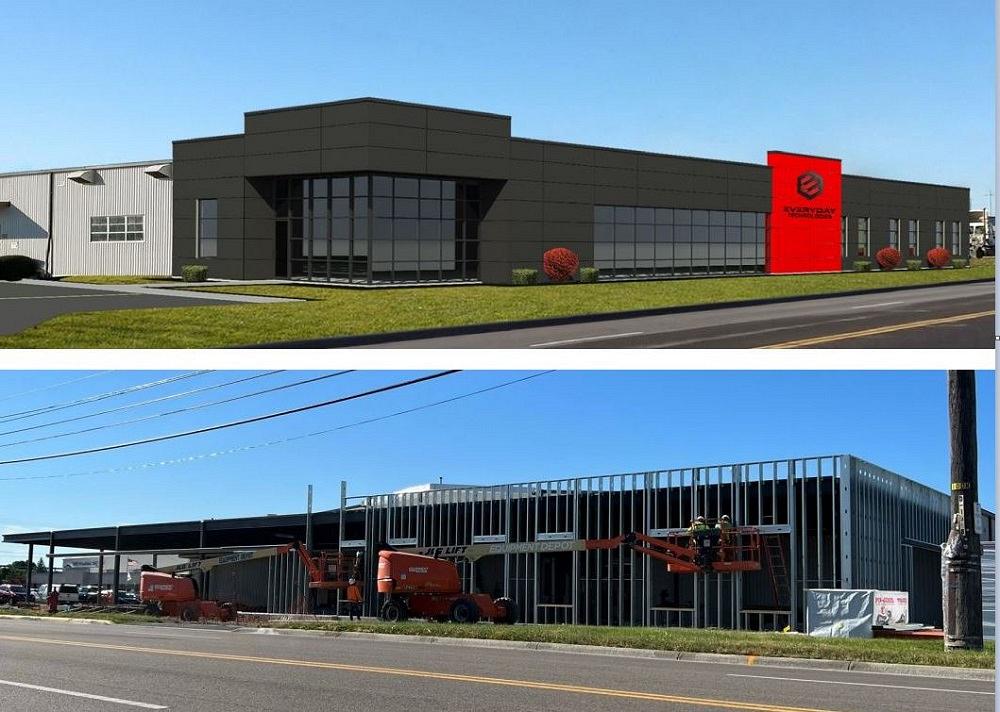
The new building and office expansion was designed to show employees and customers the fabricator’s commitment to growth.
“Over the past five years, the previous owners really addressed the welding area of our business, standardizing operations and working with a CWI consultant to build procedures and standards. The OEMs we produce parts for expect the best of the best.” He added that the fabricator now is expanding its welding cells to accept larger weldments, some 24 ft. long and 6 ft. wide, destined for the oil and gas industry.
In the Office, Looks Matter
Let’s be honest: Stepping into the front office of a typical fab shop is usually a forgettable experience. Traditionally, most operations have focused on machinery and a productive shop floor. When customers see images of machines in action, they see production getting done and parts being shipped.
Lee’s in tune with this, hence the reason for the company’s recent technology investment, but he also values how the office looks. “The office space was never really important,” Lee said. “It was basically a hallway with chairs on either side. The office addition will set the tone for our commitment to growth, and for people to be proud and excited to show up to work. I’m a young guy, and if I had to choose between this hallway and a beautiful new office space that’s open concept with a ping pong table, vending machines, exposed ceiling, and concrete floors, I’d want to work there. We spend most of our waking life at work. You should have a place where you’re proud to come to and you’re excited to show customers. That all shows our commitment to growth.”
Truth on the Shop Floor
By expanding current capacity, Lee said, Everyday has focused most of its growth to serve the growing needs of its current customer base. “We’ve identified a few industries that are outside our core area, and we want to purposely make room for them because we think there’s a lot of growth there in the coming years,” Lee said, “but outside that, our primary focus will be offering more to our current customers. We know their businesses. We have good relationships. They know our commitment in terms of capital investment.
“Yes, we want to diversify our business, so if a market change comes, we’re not severely impacted. I don’t want any particular customer or industry representing more than 20% of our business,” Lee continued. “But I also don’t want to grow by having 100 different customers. Instead, I’d like a core group of customers where we can focus our business.”
Before taking the reins in 2021, Lee knew he was entering an environment that focused on quality, as evident by its investment in welding talent—but not necessarily on aggressive growth. Focused on people and the community, the previous owners didn’t want an investor to gut the place. “That’s why, for those first few months, I didn’t rock the boat. I was like a sponge,” Lee said. “I wanted to learn what we do well, what we don’t do well, and what the challenges were.”
This careful approach prevented Lee from making decisions that went against the company’s core competencies. His strategy with Everyday’s wire harness business is a prime example. The synergies between wire harnesses and metal fabrication are obvious. But as Lee dug deeper, he discovered how the wire harness business continued to operate independently. There wasn’t much cross-selling between sheet metal and wire.
“I brought my brother-in-law [Andrew Gilardi] on as co-owner and general manager of that business unit,” Lee said. “He comes from the plastic injection molding world, and his goal is not to be distracted by metal fabrication. We want him to live and breathe the wire harness world.” Rocking the boat and dictating a wire-harness sales strategy around Everyday’s sheet metal business “would seem like a bunch of metal fabrication guys coming in and trying to understand the wire harness world.”
At the same time, Lee hasn’t shied away from change. This summer, for instance, the wire harness team moved from its original facility to a new building about a mile away from Everyday’s Sidney headquarters. He emphasized, however, that only the location has changed; the strategy hasn’t. The wire harness business will continue to build on its own. “One day, we’ll develop the synergy between sheet metal and wire,” Lee said. “We’re just not there yet.”
Such restraint shows the necessary balance between big ideas and the need to listen and learn the realities of what’s happening on the ground. As the late Dick Kallage, longtime fabrication industry consultant (informally known as “the shop whisperer”) once said, truth resides on the shop floor. Like Lee, careful listeners hear the truth, recognize organizational strength and weaknesses, and, over the long term, succeed in implementing impactful change.
About the Author

Tim Heston
2135 Point Blvd
Elgin, IL 60123
815-381-1314
Tim Heston, The Fabricator's senior editor, has covered the metal fabrication industry since 1998, starting his career at the American Welding Society's Welding Journal. Since then he has covered the full range of metal fabrication processes, from stamping, bending, and cutting to grinding and polishing. He joined The Fabricator's staff in October 2007.
Related Companies
subscribe now

The Fabricator is North America's leading magazine for the metal forming and fabricating industry. The magazine delivers the news, technical articles, and case histories that enable fabricators to do their jobs more efficiently. The Fabricator has served the industry since 1970.
start your free subscription- Stay connected from anywhere

Easily access valuable industry resources now with full access to the digital edition of The Fabricator.

Easily access valuable industry resources now with full access to the digital edition of The Welder.

Easily access valuable industry resources now with full access to the digital edition of The Tube and Pipe Journal.
- Podcasting
- Podcast:
- The Fabricator Podcast
- Published:
- 04/16/2024
- Running Time:
- 63:29
In this episode of The Fabricator Podcast, Caleb Chamberlain, co-founder and CEO of OSH Cut, discusses his company’s...
- Industry Events
16th Annual Safety Conference
- April 30 - May 1, 2024
- Elgin,
Pipe and Tube Conference
- May 21 - 22, 2024
- Omaha, NE
World-Class Roll Forming Workshop
- June 5 - 6, 2024
- Louisville, KY
Advanced Laser Application Workshop
- June 25 - 27, 2024
- Novi, MI
























